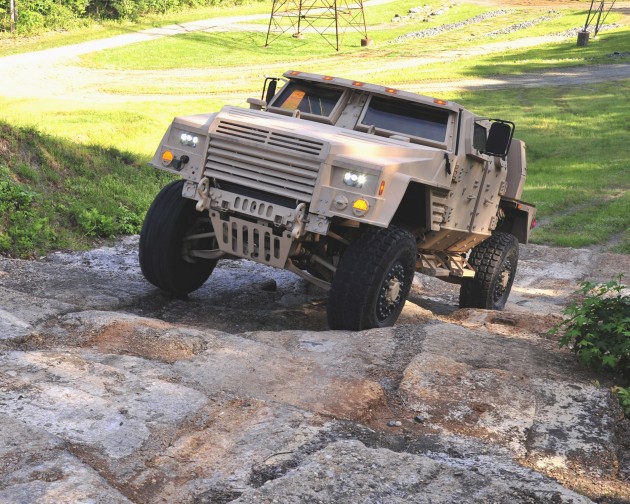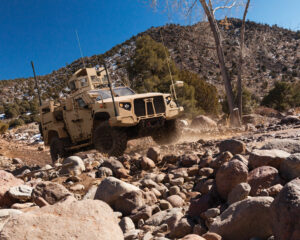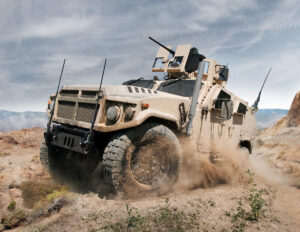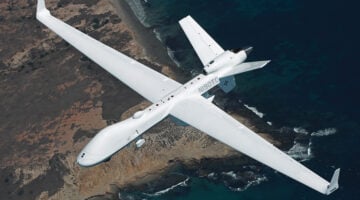
WASHINGTON: Lockheed Martin just dropped its suit against the government for awarding the giant Joint Light Tactical Vehicle contract to truck-maker Oshkosh. Why now?
“After careful deliberation, Lockheed Martin has withdrawn its protest of the JLTV contract award decision in the Court of Federal Claims” was all the company would say. But it turns out neither the legal nor the technological aspects of the case were going well for the world’s largest defense contractor.
Six days ago, the judge refused to issue a stop-work order to Oshkosh, allowing them to keep working on JLTV while the case proceeded — a sign he didn’t consider Lockheed’s case compelling. Not quite two weeks before that, buried in a 472-page annual report, the Pentagon’s independent Director of Operational Test & Evaluation released a scathing assessment of the Lockheed JLTV prototypes’ reliability: Oshkosh’s winning entry lasted almost six times as long between breakdowns.

It came as a surprise to many — myself included — when Lockheed protested the JLTV award to the Government Accountability Office, even though the other losing contender, Humvee maker AM General, did not. But GAO protests on big contracts are fairly routine; Lockheed’s actually party to another one they just lost, over the award of the Long Range Strike Bomber to Northrop Grumman. It came as a bigger surprise when Lockheed filed suit over JTLV with the Court of Federal Claims, definitely not a routine action. And it surprised me again when Lockheed dropped that case.
The outcome didn’t surprise James Hasik, however. The Atlantic Council fellow and industry analyst told me this morning Lockheed was always a long shot for JLTV. The skills to build small numbers of high-cost stealth fighters and satellites don’t translate well to the lower-tech world of truck-building, where Oshkosh had the homefield advantage.

“I applaud Lockheed’s effort, and I wouldn’t have been shocked if the company had won, but I’m not surprised that Oshkosh did. I figured that outfit the favorite from the start,” Hasik said. “Lockheed, I’m sure, has brilliant engineers, and may have hired a bunch with experience at past MRAP-makers. But…it’s not a truck company, and automotive design-for-manufacturing requires a whole other set of organizational skills.”
“Tellingly, the details revealed in DOT&E’s recent report to Congress seemed pretty conclusive,” Hasik said. “Lockheed’s truck was as survivable as Oshkosh’s, but failed reliability testing, and by a big margin.”
The DOT&E report is damning. The reliability requirement for JLTV was to average 2,400 miles between significant failures. (Mean Miles Between Operational Mission Failure, MMBOMF, is the technical term). The current uparmored Humvee beats that, reaching 2,968 miles. Oshkosh’s entry hit it out of the park with 7,051 miles. Lockheed’s fell well short, at just 1,271 miles. AM General, amazingly, managed a measly 526 miles — perhaps explaining why they didn’t even bother to protest.

Lockheed had based its lawsuit on the claim that the Army had withheld troves of relevant documents from the GAO — but apparently nothing in them was as powerful as those reliability figures. While GAO didn’t have time to review the documents before its deadline, Lockheed and the Court of Federal Claims have had them since early December.
“My best guess is that the Lockheed’s leadership took the denial of the stop-work request as a sign of the eventual decision,” Hasik said. “The court had had time to read those (what we were told was) hundreds of pages of additional documents from the Army Department that the GAO had lacked. Denying the request for an injunction indicated that there was probably nothing probative in there.”
So what is the impact on Lockheed Martin of its “three strikes and you’re out” moment” — failing to connect in the Army competition, the GAO review, and the Court of Federal Claims case? With the Pentagon’s largest contract in history, the F-35 Joint Strike Fighter, well in hand, the aerospace giant won’t suffer overmuch from losing any one competition. But its ground vehicle division had bet heavily on JLTV, even setting up a new high-tech production line in Camden, AR. And suing your customer is generally not great for client relations, another compelling reason for Lockheed to cut its losses and drop the suit.
“Lockheed Martin is a conservative company that tries to avoid antagonizing its customers,” said Loren Thompson, a defense industry analyst and consultant who’s worked with Lockheed. “Even when the company feels it has been unfairly treated in a source selection or program decision, it always weighs the benefits of complaining against the potential downside of impairing customer relations.”
In the bigger picture, Thompson continued, “Lockheed has so much business with the Army, from missile defense to rotorcraft to munitions, that JLTV would have been just one piece of a much bigger land warfare portfolio. I would expect the company to take a similar approach to any further action on the bomber award: With F-35A, C-130J and several major space programs depending on Air Force support, sometimes you just have to walk away even though you think the customer has made a mistake.”
What’s the wider significance for the Army? The end of the court case is a kind of validation, Hasik said. “I have heard that the JPO [Joint Program Office] had done a really good job of crafting the acquisition strategy and the competition,” he told me. “It’s possible that the Army Department is starting to get past its recent history of acquisition fiascos. So I’m encouraged.”

